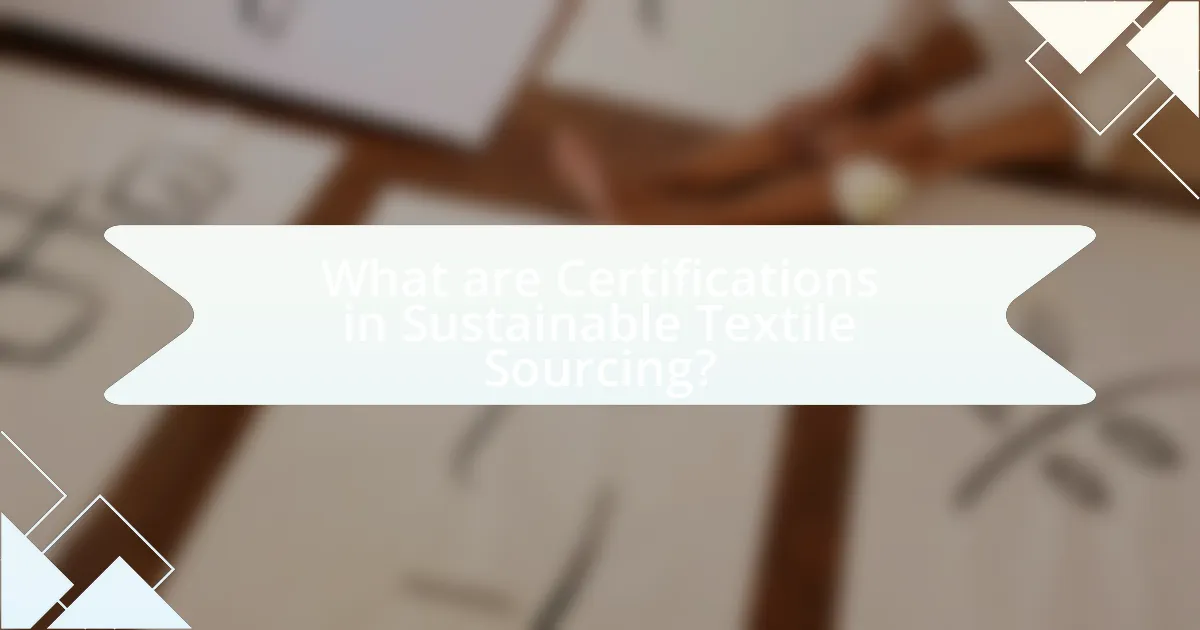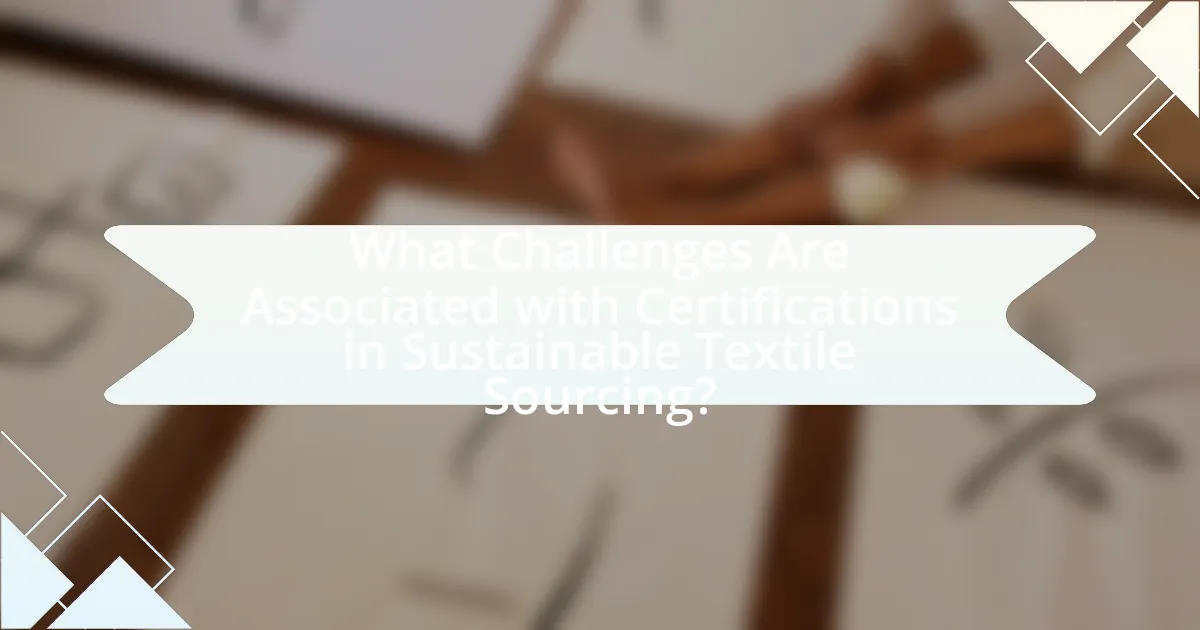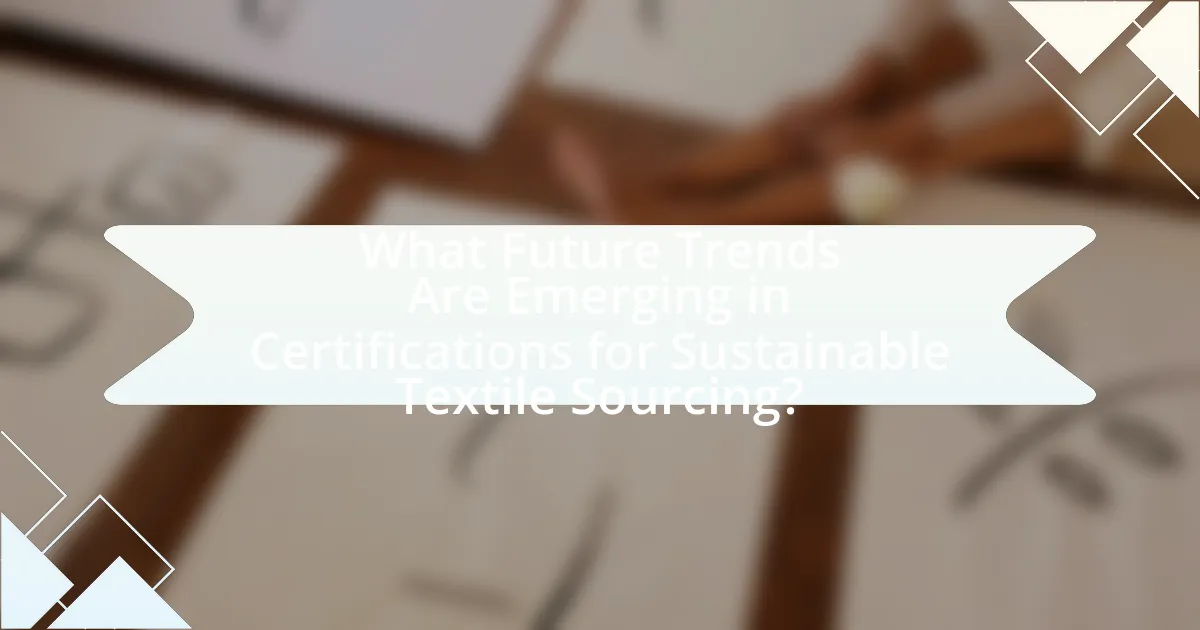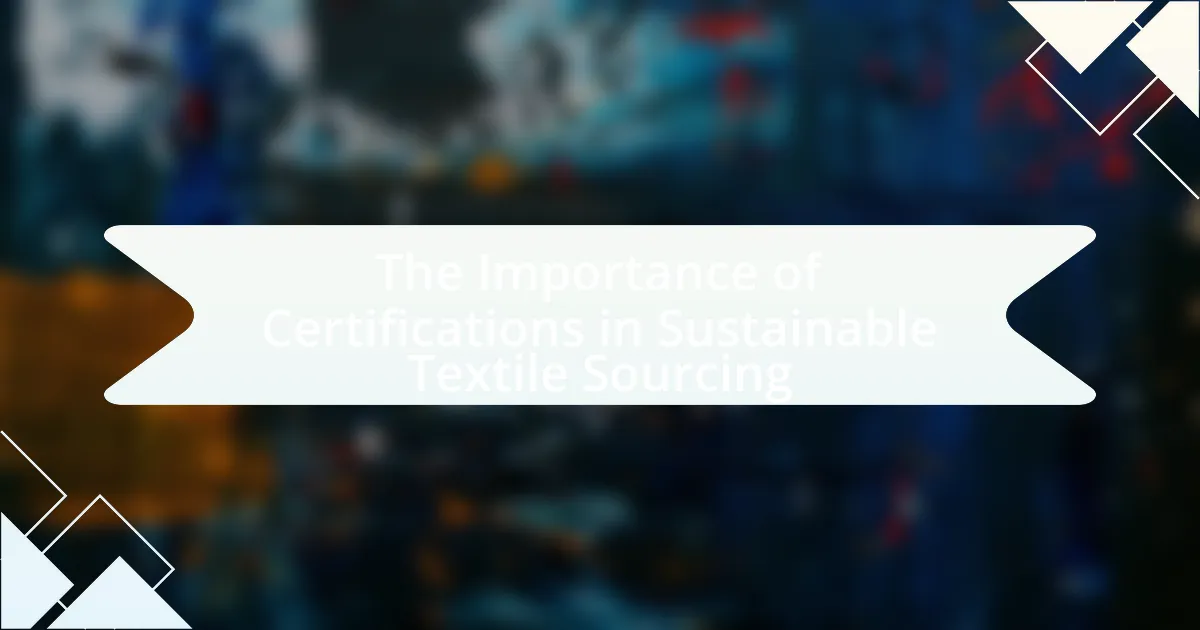Certifications in sustainable textile sourcing are formal recognitions that validate a textile product’s compliance with specific environmental and social standards, such as the Global Organic Textile Standard (GOTS) and OEKO-TEX Standard 100. These certifications are crucial for ensuring responsible sourcing practices, promoting organic farming, fair labor conditions, and minimizing environmental impact. The article explores the significance of these certifications in building consumer trust, influencing supply chain practices, and driving industry-wide changes towards sustainability. It also addresses the challenges associated with obtaining certifications, the role of technology in enhancing transparency, and emerging trends that shape the future of sustainable textile sourcing.

What are Certifications in Sustainable Textile Sourcing?
Certifications in sustainable textile sourcing are formal recognitions that verify a textile product’s adherence to specific environmental and social standards. These certifications ensure that materials are sourced responsibly, promoting practices such as organic farming, fair labor conditions, and reduced environmental impact. For instance, certifications like Global Organic Textile Standard (GOTS) and OEKO-TEX Standard 100 provide guidelines that textiles must meet to be labeled as sustainable, ensuring transparency and accountability in the supply chain.
Why are Certifications Important in Sustainable Textile Sourcing?
Certifications are important in sustainable textile sourcing because they provide verified assurance that products meet specific environmental and social standards. These certifications, such as Global Organic Textile Standard (GOTS) and OEKO-TEX, ensure that textiles are produced with minimal environmental impact and adhere to ethical labor practices. For instance, GOTS requires that at least 70% of the fibers in a textile product be organic, while OEKO-TEX tests for harmful substances, ensuring consumer safety. This verification builds consumer trust and encourages brands to adopt sustainable practices, ultimately driving industry-wide change towards more responsible sourcing.
What role do certifications play in promoting sustainability?
Certifications play a crucial role in promoting sustainability by providing standardized benchmarks that organizations must meet to demonstrate their commitment to environmentally friendly practices. These certifications, such as Global Organic Textile Standard (GOTS) and OEKO-TEX, ensure that products are produced with minimal environmental impact and adhere to social responsibility criteria. For instance, GOTS certification requires compliance with strict ecological and social criteria throughout the entire textile supply chain, from raw material sourcing to manufacturing processes. This not only helps consumers identify sustainable products but also encourages manufacturers to adopt sustainable practices to achieve certification, thereby driving industry-wide improvements in sustainability.
How do certifications impact consumer trust in textile sourcing?
Certifications significantly enhance consumer trust in textile sourcing by providing verified assurance of ethical and sustainable practices. When consumers see certifications such as Global Organic Textile Standard (GOTS) or OEKO-TEX, they are more likely to believe that the products meet specific environmental and social criteria. Research indicates that 66% of consumers are willing to pay more for sustainable brands, highlighting the importance of certifications in influencing purchasing decisions. Furthermore, a study by Nielsen found that 73% of millennials are willing to pay extra for sustainable offerings, demonstrating that certifications serve as a critical factor in building trust and credibility in the textile industry.
What Types of Certifications Exist for Sustainable Textiles?
Various certifications exist for sustainable textiles, including Global Organic Textile Standard (GOTS), OEKO-TEX Standard 100, and Fair Trade Certified. GOTS ensures organic status from harvesting through manufacturing, requiring compliance with environmental and social criteria. OEKO-TEX Standard 100 certifies textiles free from harmful substances, promoting safety for consumers. Fair Trade Certified focuses on equitable trade practices, ensuring fair wages and working conditions for producers. These certifications provide consumers with assurance regarding the sustainability and ethical practices involved in textile production.
What are the most recognized certifications in the industry?
The most recognized certifications in the sustainable textile sourcing industry include Global Organic Textile Standard (GOTS), OEKO-TEX Standard 100, and Fair Trade Certified. GOTS is widely acknowledged for its rigorous environmental and social criteria, ensuring organic status from harvesting through manufacturing. OEKO-TEX Standard 100 certifies textiles free from harmful substances, promoting consumer safety. Fair Trade Certified focuses on equitable trade practices, ensuring fair wages and working conditions for producers. These certifications are essential for brands aiming to demonstrate commitment to sustainability and ethical practices in textile sourcing.
How do different certifications vary in their criteria and focus?
Different certifications vary in their criteria and focus by addressing specific aspects of sustainability, ethical practices, and environmental impact within the textile industry. For instance, the Global Organic Textile Standard (GOTS) emphasizes organic fiber content and environmentally friendly manufacturing processes, while the OEKO-TEX Standard 100 focuses on the absence of harmful substances in textiles. Additionally, certifications like Fair Trade prioritize social equity and fair labor practices, contrasting with others that may concentrate solely on environmental sustainability. This differentiation is crucial as it allows stakeholders in the textile supply chain to select certifications that align with their specific sustainability goals and consumer expectations.
How Do Certifications Influence Supply Chain Practices?
Certifications significantly influence supply chain practices by establishing standardized criteria that enhance transparency, accountability, and sustainability. These certifications, such as Global Organic Textile Standard (GOTS) and OEKO-TEX, require compliance with specific environmental and social criteria, which compel companies to adopt sustainable practices throughout their supply chains. For instance, a study by the Textile Exchange found that companies with certifications reported a 30% increase in sustainable sourcing practices, demonstrating a direct correlation between certification and improved supply chain performance. Additionally, certifications often lead to better market access and consumer trust, as they signal commitment to ethical practices, thereby influencing purchasing decisions and ultimately shaping supply chain dynamics.
What are the benefits of certified sourcing for manufacturers?
Certified sourcing provides manufacturers with enhanced credibility, access to new markets, and improved supply chain transparency. By obtaining certifications, manufacturers demonstrate compliance with industry standards, which can lead to increased consumer trust and brand loyalty. For instance, certifications like GOTS (Global Organic Textile Standard) or OEKO-TEX assure customers of sustainable practices and product safety, potentially boosting sales. Furthermore, certified sourcing often results in better relationships with suppliers, as it encourages adherence to ethical practices and quality assurance, ultimately leading to reduced risks and increased operational efficiency.
How do certifications affect relationships with suppliers?
Certifications enhance relationships with suppliers by establishing trust and credibility. When suppliers hold recognized certifications, such as GOTS (Global Organic Textile Standard) or OEKO-TEX, it signals their commitment to quality and sustainability, which can lead to stronger partnerships. Research indicates that companies with certified suppliers often experience improved communication and collaboration, as certifications provide a common framework for expectations and standards. For instance, a study published in the Journal of Cleaner Production found that certified suppliers are more likely to engage in sustainable practices, which aligns with the values of brands focused on ethical sourcing. This alignment fosters loyalty and long-term relationships, ultimately benefiting both parties.

What Challenges Are Associated with Certifications in Sustainable Textile Sourcing?
Challenges associated with certifications in sustainable textile sourcing include high costs, complexity of standards, and lack of consumer awareness. High costs can deter small and medium-sized enterprises from obtaining certifications, as they often require significant financial investment for compliance and auditing. The complexity of various certification standards can lead to confusion among manufacturers and retailers, making it difficult to choose the appropriate certification that aligns with their sustainability goals. Additionally, a lack of consumer awareness about the significance of these certifications can result in limited market demand, undermining the efforts of companies that invest in sustainable practices. These challenges hinder the widespread adoption of sustainable textile sourcing practices.
What are the common barriers to obtaining certifications?
Common barriers to obtaining certifications include high costs, lack of awareness, and complex application processes. High costs can deter individuals and organizations from pursuing certifications, as fees for training, exams, and renewal can accumulate significantly. Lack of awareness about available certifications and their benefits can prevent potential candidates from seeking them out. Additionally, complex application processes, which often require extensive documentation and compliance with specific standards, can overwhelm applicants and lead to delays or abandonment of the certification pursuit. These barriers are supported by industry reports indicating that financial constraints and procedural difficulties are frequently cited by professionals as reasons for not obtaining certifications in sustainable practices.
How can companies overcome these barriers?
Companies can overcome barriers to sustainable textile sourcing by investing in education and training for their supply chain partners. This approach ensures that all stakeholders understand the importance of certifications and the benefits of sustainable practices. Research indicates that companies that provide training see a 30% increase in compliance with sustainability standards, as reported by the Textile Exchange in their 2021 Sustainability Report. Additionally, forming partnerships with certification bodies can streamline the certification process, making it more accessible and less daunting for suppliers. By actively engaging in these strategies, companies can effectively navigate and reduce the barriers associated with sustainable textile sourcing.
What are the costs associated with certification processes?
The costs associated with certification processes in sustainable textile sourcing typically include application fees, annual renewal fees, and costs for audits and inspections. For instance, obtaining certifications such as Global Organic Textile Standard (GOTS) can incur initial application fees ranging from $500 to $2,000, depending on the size and complexity of the operation. Additionally, annual fees for maintaining certification can range from $300 to $1,500. Audit costs, which may vary based on the certification body and the scope of the audit, can add another $1,000 to $5,000 per year. These financial commitments are essential for ensuring compliance with sustainability standards and can significantly impact the overall budget of textile sourcing operations.
How do Certifications Address Issues of Transparency and Accountability?
Certifications enhance transparency and accountability by establishing standardized criteria that organizations must meet to demonstrate compliance with ethical and sustainable practices. These certifications, such as Global Organic Textile Standard (GOTS) and OEKO-TEX, require third-party audits, which provide an independent verification of claims made by companies regarding their sourcing and production processes. For instance, GOTS-certified facilities must adhere to strict environmental and social criteria, ensuring that consumers can trust the integrity of the products they purchase. This independent verification process not only holds companies accountable for their practices but also fosters consumer confidence by providing clear, accessible information about the sustainability of textile products.
What mechanisms are in place to ensure compliance with certification standards?
Compliance with certification standards is ensured through a combination of regular audits, third-party assessments, and continuous monitoring. These mechanisms involve independent organizations conducting scheduled and unscheduled inspections to verify adherence to established criteria. For instance, certifications like Global Organic Textile Standard (GOTS) require annual audits by accredited certifying bodies to confirm compliance with environmental and social criteria. Additionally, companies often implement internal compliance programs that include training and documentation to maintain standards. This structured approach not only promotes accountability but also fosters transparency in sustainable textile sourcing practices.
How do certifications promote ethical practices in textile sourcing?
Certifications promote ethical practices in textile sourcing by establishing standardized criteria that suppliers must meet to demonstrate compliance with social, environmental, and labor regulations. These certifications, such as Global Organic Textile Standard (GOTS) and Fair Trade, require adherence to specific guidelines that ensure fair wages, safe working conditions, and sustainable environmental practices. For instance, GOTS-certified textiles must contain at least 70% organic fibers and adhere to strict environmental and social criteria throughout the supply chain. This transparency and accountability foster trust among consumers and encourage brands to prioritize ethical sourcing, ultimately leading to improved industry standards and practices.

What Future Trends Are Emerging in Certifications for Sustainable Textile Sourcing?
Future trends in certifications for sustainable textile sourcing include increased integration of blockchain technology, a focus on circular economy principles, and the rise of consumer-driven certification standards. Blockchain technology enhances transparency and traceability in supply chains, allowing consumers to verify the sustainability claims of textile products. The circular economy approach emphasizes certifications that promote recycling and waste reduction, aligning with global sustainability goals. Additionally, consumer awareness is driving brands to adopt certifications that resonate with ethical practices, such as Fair Trade and Global Organic Textile Standard (GOTS), reflecting a shift towards more responsible sourcing practices. These trends indicate a growing demand for accountability and sustainability in the textile industry.
How is technology influencing certification processes?
Technology is significantly influencing certification processes by enhancing efficiency, accuracy, and accessibility. Digital platforms enable real-time tracking and verification of compliance with sustainability standards, which streamlines the certification process. For instance, blockchain technology provides a transparent and immutable record of transactions, ensuring that all claims regarding sustainable practices can be verified. According to a report by the World Economic Forum, the use of blockchain in supply chains can reduce certification costs by up to 30% and increase trust among stakeholders. Additionally, data analytics tools allow for better monitoring of compliance, enabling organizations to identify areas for improvement and ensure adherence to certification requirements more effectively.
What role do digital platforms play in enhancing certification transparency?
Digital platforms significantly enhance certification transparency by providing accessible, real-time information about certified products and their compliance with sustainability standards. These platforms enable stakeholders, including consumers and businesses, to verify certifications through digital records, reducing the risk of fraud and misinformation. For instance, blockchain technology is increasingly used to create immutable records of certification data, ensuring that all claims regarding sustainability can be traced back to verified sources. This transparency fosters trust among consumers and encourages brands to maintain high standards, as evidenced by the rise in consumer demand for ethically sourced products, which has been documented in various market studies.
How are consumer preferences shaping the future of textile certifications?
Consumer preferences are increasingly driving the evolution of textile certifications by prioritizing sustainability, transparency, and ethical practices. As consumers become more environmentally conscious, they demand certifications that reflect these values, such as GOTS (Global Organic Textile Standard) and OEKO-TEX, which ensure organic and non-toxic materials. A survey by McKinsey & Company found that 67% of consumers consider sustainability when making a purchase, indicating a clear shift towards certified products that align with their ethical standards. This growing demand compels brands to adopt and promote certifications, thereby shaping the future landscape of textile sourcing towards more sustainable practices.
What Best Practices Should Companies Follow for Effective Certification?
Companies should follow best practices such as establishing clear certification goals, engaging stakeholders, and ensuring compliance with standards for effective certification. Clear goals help define the scope and purpose of certification, while stakeholder engagement fosters collaboration and transparency, essential for credibility. Compliance with recognized standards, such as ISO or GOTS, ensures that the certification process meets industry benchmarks, enhancing trust and marketability. According to a study by the Textile Exchange, companies that adhere to these practices see a 30% increase in consumer trust and brand loyalty, demonstrating the tangible benefits of effective certification in sustainable textile sourcing.
How can companies choose the right certifications for their needs?
Companies can choose the right certifications for their needs by assessing their specific sustainability goals and aligning them with relevant certification standards. This involves identifying the key areas of focus, such as environmental impact, social responsibility, or supply chain transparency, and then researching certifications that address these areas, such as Global Organic Textile Standard (GOTS) for organic materials or Fair Trade for ethical labor practices. Additionally, companies should consider the credibility and recognition of the certification within the industry, as well as the certification’s requirements and costs, to ensure it fits their operational capabilities and market expectations.
What strategies can enhance the effectiveness of certification in sustainable sourcing?
Implementing multi-stakeholder engagement is a key strategy to enhance the effectiveness of certification in sustainable sourcing. This approach involves collaboration among brands, suppliers, NGOs, and consumers to ensure that certification standards are relevant and widely accepted. Research indicates that certifications with broad stakeholder involvement, such as the Global Organic Textile Standard (GOTS), achieve higher compliance rates and consumer trust, as they reflect diverse perspectives and needs. Additionally, integrating technology, such as blockchain for traceability, can further validate claims of sustainability, making it easier for consumers to verify certified products. Studies show that transparency in sourcing practices leads to increased consumer confidence and loyalty, ultimately driving demand for certified sustainable textiles.

Leave a Reply